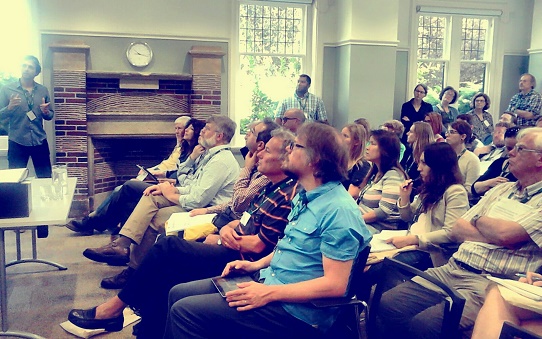The use of sociometric badges for studying group level interaction processes in research teams, and their potentialities for uncovering and confronting gender bias in work environments, have been the topics of a paper presented by Jörg Müller and Natalia Garrido at the 9th International Conference on Social Science Methodology. The event is organized by the International Sociological Association (ISA) Research Committee RC33 on Logic and Methodology every four years, and has been held in the University of Leicester on 11-16 September 2016.
Sociometric badges are smart-phone sized, sensor packed devices that supply fine grained data for analyzing patterns of (face-to-face) social interaction, non-verbal communication, and turn-taking. They have been used in studying forms of collaboration, social interaction patterns or measuring social capital, creativity and trust in teams. The type of data gathered cuts across established research methodologies and quantitative and qualitative paradigms: they provide more fine grained insights on non-verbal communication in real-life settings than traditional observational methods, and enable a new precision in the analysis of network formation and evolution, difficult to achieve with self-report studies.
Jörg Müller and Natalia Garrido, senior researcher and PhD candidate of Gender and ICT respectively, focused their contribution on elaborating the specificity of sociometric data (e.g. available data dimensions) and how it dovetails existing social science research methodologies. Furthermore, they exposed practical matters such as concerns of research ethics and data privacy, the quality of the data and possible approaches for analysis. The presentation closed with a discussion on the advantages and pitfalls of using sociometric data for progressive social change.
This research is embedded in the H2020 project GEDII (2015-2018), which addresses the impact of gender diversity on research performance. Know more about the GEDII project on this website.
